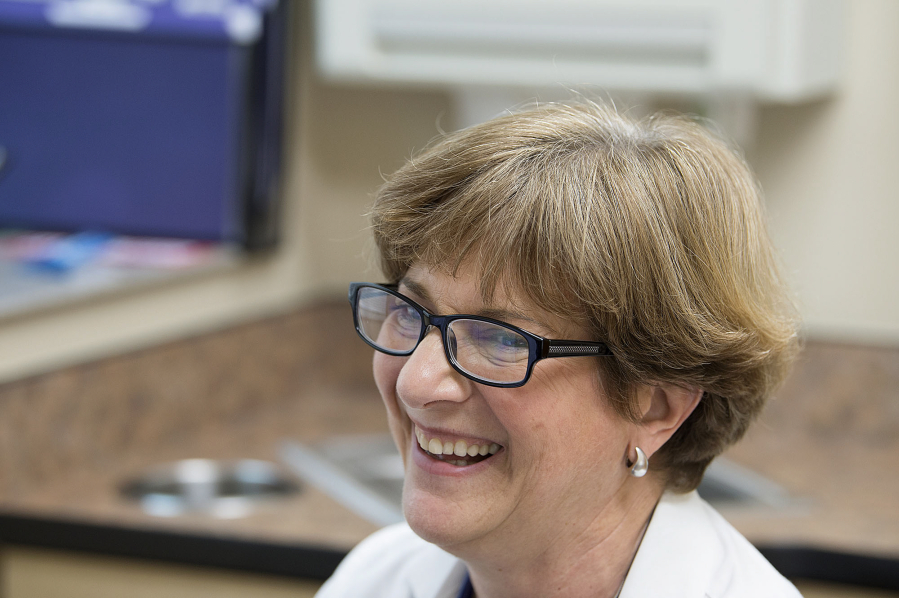The first question Dr. Ronnie-Gail Emden was asked when she arrived for her job interview was how she would manage to be a mother and a doctor.
It was 1982 and Emden, who was completing her residency in obstetrics and gynecology, had applied to be the first female physician at The Vancouver Clinic. At the time, the clinic employed 20-some male physicians, and a maternity leave policy didn’t exist.
Interviewers wanted to know what would happen if Emden got pregnant. How would she manage to be a full-time doctor and mother? What they didn’t know was Emden was six weeks pregnant with her first child.
Emden was offered the job, making her not only the first female physician at The Vancouver Clinic but also the first female OB/GYN in private practice in Clark County. When she arrived for her first day of work in January 1983, Emden was six months pregnant.
If You Go
• What: Retirement celebration for Dr. Ronnie-Gail Emden.
• Who: Former and current colleagues and patients are invited.
• When: 5:30 to 7:30 p.m. Feb. 1.
• Where: The Vancouver Clinic, 700 N.E. 87th Ave., Vancouver.
“Right in that first year, things happened at The Vancouver Clinic that had never happened before,” Emden said.
In the months and years following her arrival, Emden helped the clinic craft policies centered around being a working mother and helping providers — men and women — find their own work-family balance, said Dr. Alfred Seekamp, The Vancouver Clinic’s chief medical officer.
Before Emden came on board, the clinic didn’t have policies on maternity leave or breast feeding, nor did it allow providers to job-share or work less than full time. Now, all of those exist and are a key to helping attract quality providers to The Vancouver Clinic, Seekamp said.
Emden will see her last patient on Feb. 2. She’s retiring after 34 years on the job.
“She had a huge impact on our organization that will continue after she’s retired,” Seekamp said. “Her presence will have a lasting effect on The Vancouver Clinic and the community”
Pioneering work
Many people are surprised to hear Emden’s 1983 arrival marked the first female physician hire at The Vancouver Clinic, she said.
“It seems like that was late in the process, but it really wasn’t,” Emden said.
“I’ve been called the pioneer,” she added. “The reality is it goes much farther back than that.”
Societal changes in the 1960s and 1970s really laid the groundwork, Emden said.
Emden began her undergraduate education at Princeton University in 1970. She was part of just the second class of women at what had been an all-male university until 1969. In the late ’70s, as Emden was finishing medical school at Georgetown University School of Medicine, women were for the first time demanding female physicians. Prior to that, women wanted male medical providers.
“Women didn’t trust women to do it,” Emden said.
But as the demands changed, Emden felt a pull to meet that need. She was a woman, a feminist, and she should be caring for other women. She decided to become an OB/GYN.
When Emden began her residency at the University of North Carolina, Chapel Hill in 1978, only one other woman had completed the OB/GYN program.
Upon completing her residency, Emden and her husband, Andy Wilson, moved to the Northwest. Wilson went to work for Intel; Emden joined The Vancouver Clinic.
Tech revolution
Emden has seen countless changes in women’s health care during her career. The biggest driver of change, Emden said, has been technology.
When Emden began her residency training in the late ’70s, real-time ultrasounds didn’t exist. Many women never received ultrasounds.
“Very often, twins were diagnosed at delivery,” Emden said.
The lack of real-time ultrasounds also meant physicians didn’t know if a baby had died until delivery, she said.
Improved ultrasounds and pregnancy diagnostics have transformed OB care, Emden said.
“We can now do a lot more to pick up problems in pregnancy, to improve outcomes in pregnancy,” she said.
Another big change: pregnancy tests.
During her residency training, blood pregnancy tests didn’t exist. If a physician was worried about an ectopic pregnancy — when the fertilized egg implants outside of the uterus — the only options were a urine test, which was only about 50 percent accurate in detecting ectopic pregnancies, or surgery, Emden said.
During her last year of residency in 1982, blood tests were available, but their use was not yet widespread.
“I can’t imagine how we practiced (without them),” she said of the tests.
In more recent years, advances in surgical techniques and birth control have greatly impacted women’s health care.
“I think the robot is the newest thing I never could’ve dreamed about,” Emden said. “Robots and laparoscopic have transformed surgery.”
And the development and use of long-acting reversible contraceptives, such as intrauterine devices, have not only reduced the number of unwanted pregnancies but are being used to help manage other health issues, Emden said.
“Those are making a difference for us,” she said.
‘This is where I fit’
When Emden was hired at The Vancouver Clinic, she was one of fewer than 30 physicians. Now, as she prepares for retirement, the clinic has 215 physicians. Of those, 105 are women.
“I was prepared for this,” Emden said. “It wasn’t frightening for me to go to an all-male institution because I’d been there, done that.”
“I think I happened to be the right person, at the right place, at the right time to make that transition at this institution,” she added. “This is where I fit.”




